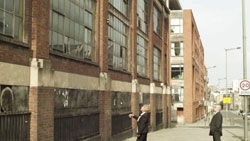In this video work, former factory workers, retired shipbuilders, bricklayers, and railway workers are shown throwing stones at the abandoned Europleasure building. The stones cast by these elderly, well-dressed individuals – accompanied in some cases by friends, spouses, or grandchildren – are aimed at the glass windowpanes of the derelict building. In most cases, the shattering of the panes elicits a smile of satisfaction from those present. Their action is accompanied by a merry-go-round tune, inspired by the Beatle’s song “Revolution” (and alluding perhaps to the connection between this rebellious act and the members of this famous music group, who were all natives of Liverpool).
The work’s climactic moment is filmed in slow motion, adding a dramatic touch to the narrative. As it turns out, the windows are not broken at random. As more and more panes are shattered, the words “Touch and go” are spelt out on the building’s façade.
The expression “touch-and-go,” which alludes to a state of uncertainty, may be related to the enterprises that once occupied this building. For working-class residents of this former industrial center, daily existence was dependent on the factories that employed them. As the global economy shifted and many of the factories shut down, this source of livelihood became increasingly uncertain.
The shattering of the glass panes – an act of protest performed by a sector of the population that is not expected to behave in such a way – reflects the shattering of “acceptable” social norms. This manifestation of anger by a traditionally docile segment of the population, which is directed against a system that no longer provides economic security, resonates with the recent acts of social protest that erupted in Spain, Israel and other places in the world.
Less Reading...
